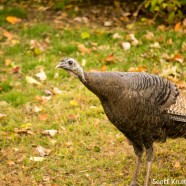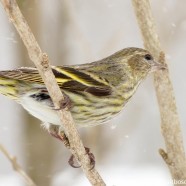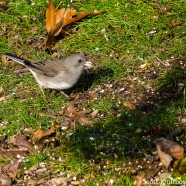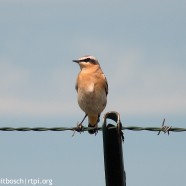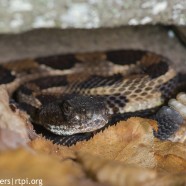Wild Turkey: vicious predator
‘Tis now the season for the Wild Turkey (Meleagris gallopavo). I have been regularly spotting a couple of groups lately, one with around 18 individuals and another with around 8. Here is one bird passing through on a showery and cloudy afternoon. It is hard to believe how rapidly the species has expanded in many areas in the last couple of decades. Is their population increase partially responsible for a decrease in some woodlands herpetofauna? I posted a great deal about Timber Rattlesnakes (Crotalus horridus) this summer, and would you believe this very turkey is a potential...
Read MorePine Siskin (Spinus pinus) invasion
A Pine Siskin (Spinus pinus) invasion is underway with birds expanding across a sizable swath of the United States. On some conducive flight mornings it is hard to go outside without seeing or hearing some flying south! Have your feeders been swamped with hungry new arrivals? If you do not have them yet you may soon.
Read MoreDark-eyed Junco (Junco hyemalis)
Have “your” Dark-eyed Juncos (Junco hyemalis) returned yet? While many of us in the Chautauqua-Allegheny region have them year-round there are millions upon millions more pouring into our yards now, readying to dine at your place all winter. Juncos can be so variable in pattern and are always a lot of fun to study on a frigid, snowy day. In the past I have particularly enjoyed seeing some with eye rings and others with wing bars! Scott Kruitbosch Conservation & Outreach Coordinator
Read MoreNorthern Wheatear season
The Northern Wheatear is undoubtedly one of my favorite North American nesting species despite the fact it is one of the toughest to find in the contiguous United States. I have no real reason for why I love the bird except for the fact that it is so difficult to call it simply a “North American” species and I admire its biology. Two populations nest on the continent with a western group breeding in Alaska and far northwest Canada with an eastern group in north central and northeastern Canada, the former group migrating southeastward across Asia to move to Europe and finally...
Read MoreTimber Rattlesnake near den
After a lot of feedback let’s keep talking about Timber Rattlesnakes today. In the Northeast, Timber Rattlesnakes are extirpated in ME and RI and down to – at best – a handful of populations in NH, VT, MA and CT. They have a severely reduced range in NY. According to the Centers for Disease Control and Prevention a grand total of about five people die per year from any venomous snake bite in all of America. The vast majority of those bitten have been harassing or aggressively attacking the snake without cause. Like nearly any other wild creature if you leave it alone it...
Read More



